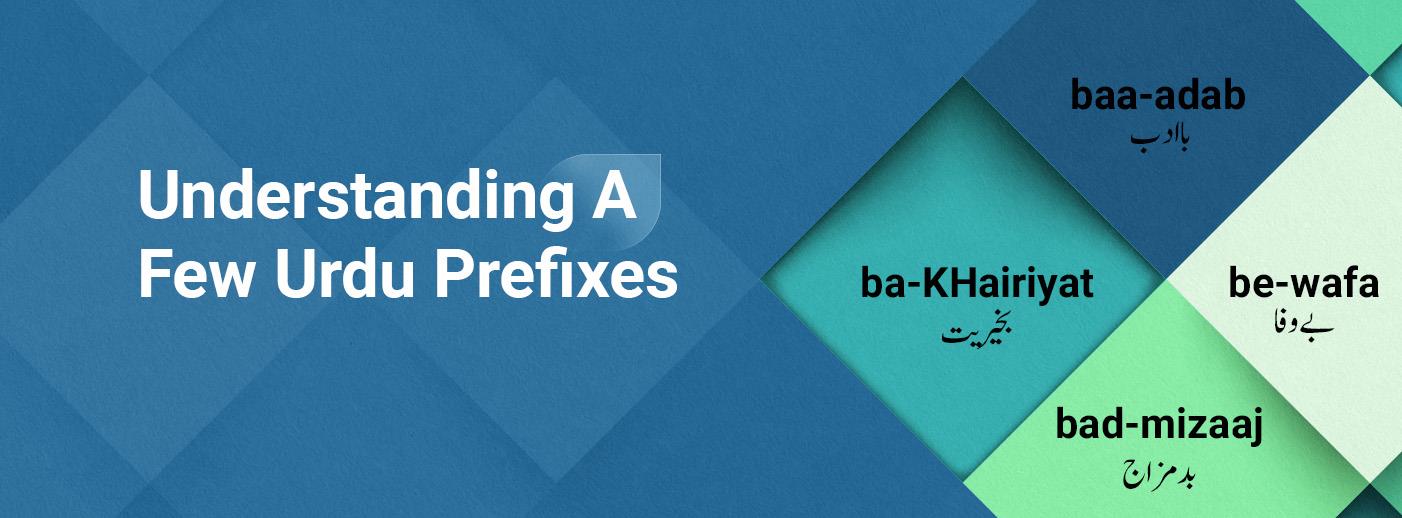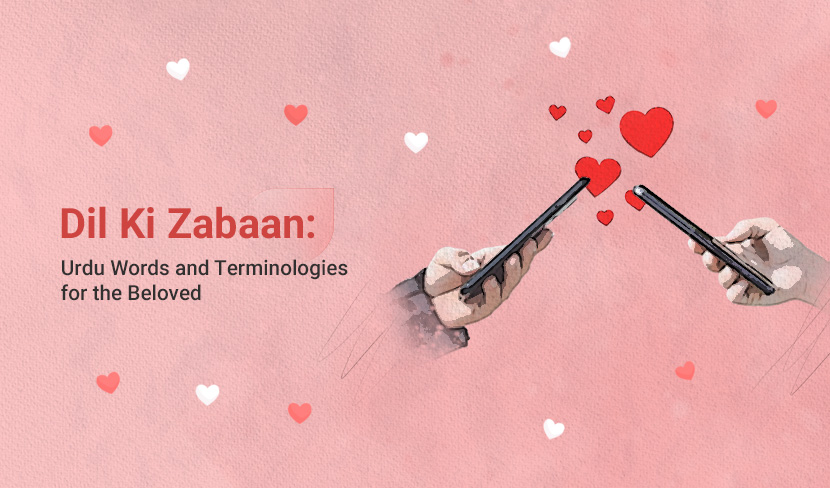अधिक खोजे गए शब्द
सहेजे गए शब्द
खिस्यानी बिल्ली खम्बा नोचे
जिसे क्रोध आ रहा हो वह अपनी खीझ या क्रोध दूसरों पर उतारता है, लाचारी में आदमी दूसरों पर क्रोध करता है, लज्जित व्यक्ति दूसरों पर अपनी लज्जा उतारता है, निर्बल की खीझ
कोशिश
कोई काम करने के लिए विशेष रूप से किया जानेवाला प्रयत्न, मेहनत, दौड़ धूप, प्रयत्न, प्रयास, चेष्टा, उद्योग, श्रम, उद्यम, उपाय, परिश्रम
आठ बार नौ त्योहार
सुख-सुविधा और आराम का शौक़ या लगन ऐसा बढ़ा हुआ है कि युग और समय उसको अल्प व्यय नहीं करने देता
चमनिस्तान
ऐसा बाग़ जहाँ फूल ही फूल हों, ऐसी जगह जहाँ दूर तक फूल ही फूल और हरा भरा नज़र आए, वाटिका, चमन, बाग़
दादरा
संगीत में एक प्रकार का चलता गाना (पक्के या शास्त्रीय गानों से भिन्न), एक प्रकार का गान, एक ताल
Understanding A Few Urdu Prefixes

In the formation of compound words in Urdu, the word that precedes is called saabiqa (سابقہ), or the prefix, while the word that follows is called laahiqa (لاحقہ), or the suffix.
Let’s explore some common Urdu prefixes starting with the letter "be" (ب). These prefixes are used frequently in both everyday conversation and poetic expressions.
1. Baa (با)
The prefix Baa is a Persian word that serves as a preposition in Urdu. It generally means "with" or "from." For instance, in phrases like baa-adab (باادب), meaning "with respect," or adab ke saath (ادب کے ساتھ), meaning "along with respect." It also conveys the meaning of "possessor" or "holder," as in baa-wafa (باوفا), meaning "faithful," or baa-asar (بااثر), meaning "influential."
Some commonly used words with Baa include:
• Baa-wajood (باجود), meaning "despite" or "in spite of," as in the verse:
"Ai dost ham ne tark-e-mohabbat ke baa-wajood, mahsus ki hai teri zarurat kabhi kabhi"
("O friend, despite having forsaken love, I still feel your need from time to time.")
• Baa-waqar (باوقار), meaning "distinguished" or "honourable."
2. Be (بے)
The prefix Be means "without" or "void of." It is often used in negative or absence-related contexts, such as in the words be-vafa (بے وفا), meaning "unfaithful," or be-misaal (بے مثال), meaning "incomparable" or "unique." Other common words include:
• Be-zabaan (بے زبان), meaning "mute" or "speechless," as in the verse by Shahryar:
"Abañ mili bhi to kis waqt be-zabaanoñ ko, sunaane ke liye jab koi daastaan na rahi"
("Even if we met, when would the speechless have a tale to tell?")
• Be-kaar (بے کار), meaning "useless" or "idle."
• Be-hayaa (بے حیا), meaning "shameless."
• Be-kas (بیکس), meaning "helpless" or "destitute."
3. Ba (بہ)
Ba is a preposition and is often used as a prefix. Often it is confused with prefix ba . but it convey different meanings, such as "upon," "by means of," or "with." While sometimes written as ba (ب), its usage is distinct and carries different connotations:
• Ba in the sense of "upon," as in Khaak-ba-sar (خاک بسر), meaning "dust upon the head," which metaphorically refers to someone who is very troubled.
• Ba can also mean "by means of," as in ba-fazl-e-Khuda (بفضلِ خدا), meaning "by the grace of God."
• It can indicate "from," as in ba-nam-e-Khuda (بنامِ خدا), meaning "in the name of God," or ba-jaan-o-dil (بجان و دل), meaning "with heart and soul."
• In the sense of "with," as in ba-Khairiyat (بخیریت), meaning "with safety."
• In the sense of "in," as in ba-zaahir (بظاہر), meaning "in appearance," or ba-khidmat (بخدمت), meaning "in service."
4. Bad (بد)
The prefix Bad means "bad," "corrupt," or "inauspicious." It is used in words that convey negative qualities or attributes:
• Bad-tameez (بد تمیز), meaning "ill-mannered" or "rude."
• Bad-ma'aash (بد معاش), meaning someone who engages in immoral or illegal means of earning, often used for a scoundrel or rascal.
• Bad-naseeb (بد نصیب), meaning "unfortunate" or "ill-fated."
• Bad-mizaj (بد مزاج), meaning "ill-tempered," as used by poet Bashir Badr in the following verse:
"Hai ajeeb shahr ki zindagi, na safar raha, na qayam hai,
Kahin kaarobar si dopahar, kahin bad-mizaaj si shaam hai."
("The city life is strange, neither a journey nor a stay,
Sometimes a business-like afternoon, sometimes an ill-tempered evening.")
Understanding these prefixes—Baa, Be, Ba, and Bad—is essential to mastering the nuances of the Urdu language. Each one carries its unique meaning and can transform the meaning of the root word, enriching both the language and the expression of ideas.
Delete 44 saved words?
क्या आप वास्तव में इन प्रविष्टियों को हटा रहे हैं? इन्हें पुन: पूर्ववत् करना संभव नहीं होगा





